Key takeaways:
- Effective DJ scheduling is essential for balancing gigs and personal life, requiring clear communication and flexibility.
- Having a structured schedule helps manage time, reduces stress, and enhances performance quality at events.
- Leveraging tools like digital calendars and task management apps enhances organization and prioritization of tasks.
- Building strong relationships with venue managers through communication and feedback can open future opportunities and ensure smooth performances.
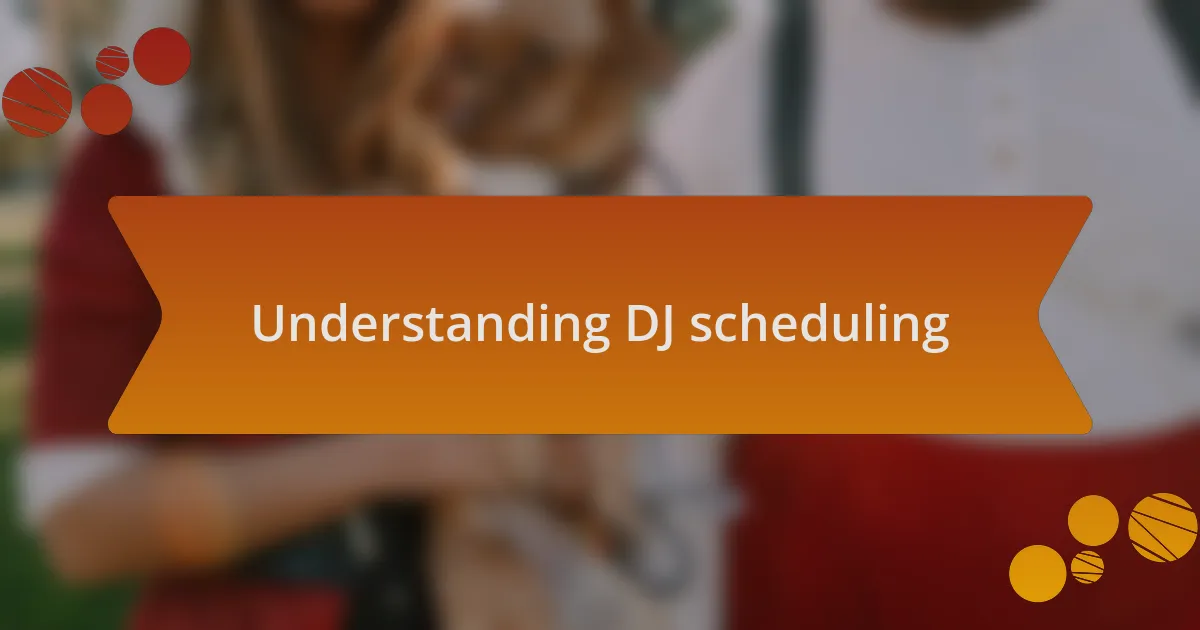
Understanding DJ scheduling
When I first began organizing my DJ schedule, I quickly realized that effective scheduling is crucial for balancing my gigs and personal life. It can be overwhelming to juggle multiple events, especially when they overlap. Have you ever found yourself torn between two great opportunities, wishing you could clone yourself to be in both places at once?
Communication is another key element in DJ scheduling. I often find that reaching out to venue managers early on not only helps in securing a spot but also fosters professional relationships. After one particularly busy weekend, I learned how a simple text or email can clear up confusion about set times, ensuring that everyone is on the same page — and it’s a total game changer.
I’ve also discovered that flexibility is vital in this fast-paced industry. Whether it’s last-minute changes or unexpected cancellations, maintaining an adaptable mindset saves me from unnecessary stress. Isn’t it funny how we often need to pivot unexpectedly? Embracing those moments has helped me grow and shape my commitments in ways I never anticipated.
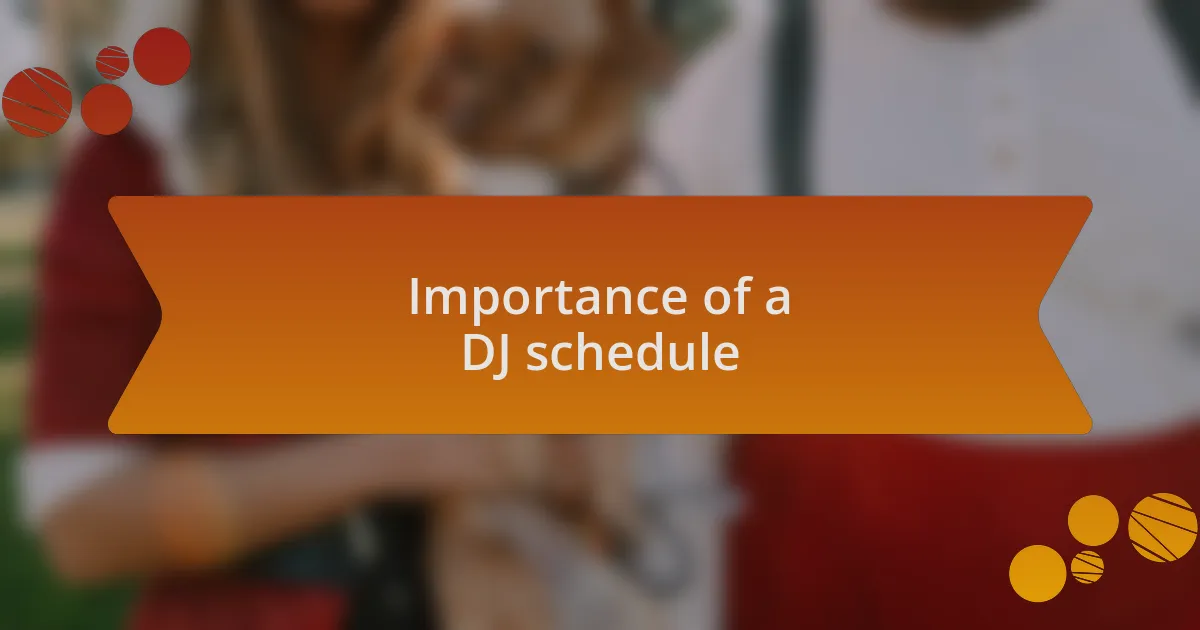
Importance of a DJ schedule
A well-organized DJ schedule is essential because it serves as my roadmap in the chaotic world of nightlife. I remember a time when I failed to keep track of a last-minute booking and ended up double-booked. The panic set in as I scrambled to figure out which gig to prioritize. This experience taught me that a clear schedule not only helps me manage my time but also prevents stressful situations that can impact my performance.
Staying on top of my DJ schedule ensures I put my best foot forward at each event. I vividly recall a night when I felt completely unprepared because I didn’t allocate enough time to practice the set for a major club, and it showed in my performance. Now, I allocate specific slots for practice, which I consider just as essential as the gigs themselves. Wouldn’t you agree that feeling confident and prepared makes a world of difference?
Additionally, having a structured schedule allows me to manage my energy levels better. Some nights are intense and high-energy, while others may require a more chill approach. By planning my gigs carefully, I ensure I can deliver my best performance consistently. The thrill of seeing the crowd dance, knowing that I am fully in sync with my schedule, is truly indescribable. Have you ever felt that rhythm when everything just clicks into place?
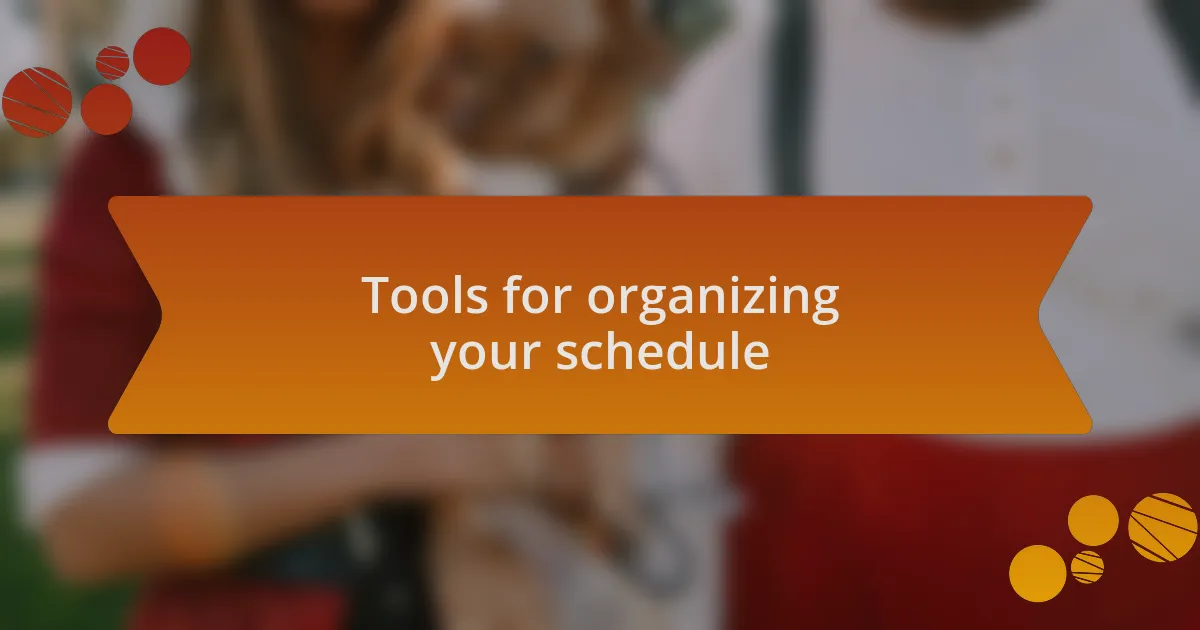
Tools for organizing your schedule
Keeping my schedule organized boils down to leveraging various tools that fit my workflow. For instance, I rely heavily on digital calendars like Google Calendar, which allows me to set reminders for gigs, deadline for set preparations, and even personal time. Have you ever missed an important event because you forgot about it? I certainly have, and that’s why syncing it all in one place has saved me from chaos.
Beyond digital solutions, I find that physical planners also play a crucial role in solidifying my schedule. Writing things down helps me absorb and commit tasks to memory, almost like a form of meditation for my busy brain. I often create a weekly layout where I can see all my gigs, meetings, and practice sessions at a glance. It’s satisfying to cross off each completed task—don’t you feel that sense of accomplishment when you can visually track your progress?
Another tool that has witnessed my journey is task management apps like Trello. The ability to create checklists and move cards around helps me prioritize what’s pressing. I still remember a hectic week filled with back-to-back events where I had to prioritize practice over other distractions. Organizing my workload not only keeps me efficient, but it also reduces stress, which is vital for maintaining that DJ flow when the lights go down. Have you considered how a small tweak in your organization can shift your focus and energy on stage?
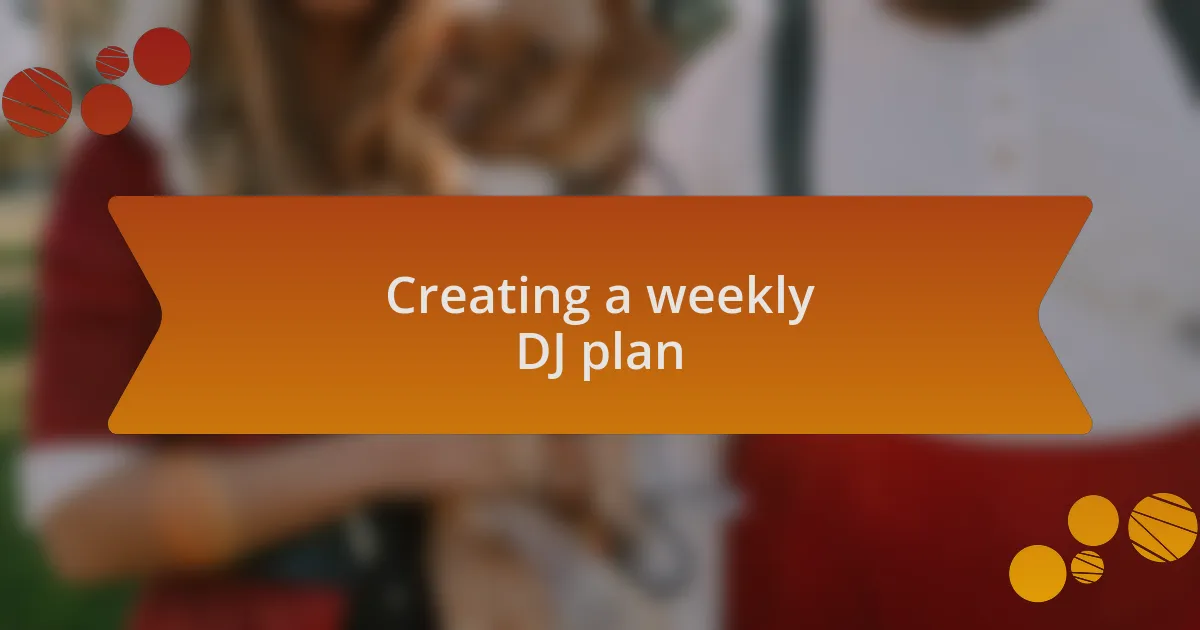
Creating a weekly DJ plan
Creating a weekly DJ plan transforms the chaos of bookings and prep time into a synchronized rhythm that sets the tone for my entire week. I often block out dedicated time slots not only for gigs but also for practice and music discovery. This structure allows me to explore new sounds without the pressure of an impending deadline looming over me—how often do we let time slip while searching for the next big track?
I’ve learned that effective planning involves flexibility too. Sometimes, unexpected opportunities arise, like a last-minute chance to spin at a venue that just opened up! On those occasions, I simply adjust my plan, shifting tasks around in my calendar. It’s exhilarating to adapt and embrace spontaneity while still maintaining a solid base. Have you experienced that thrill of juggling multiple gigs and still coming out on top?
A critical aspect of my weekly planning is allocating time for networking and promotional efforts. I remember a period when I neglected to connect with other artists, and it stunted my growth. Now, I aim to set aside a few hours each week to reach out and collaborate. Each conversation or new connection can open doors to exciting gigs or creative projects, reminding me that relationships are just as vital as the music itself. What strategies do you use to ensure your networking doesn’t fall by the wayside?
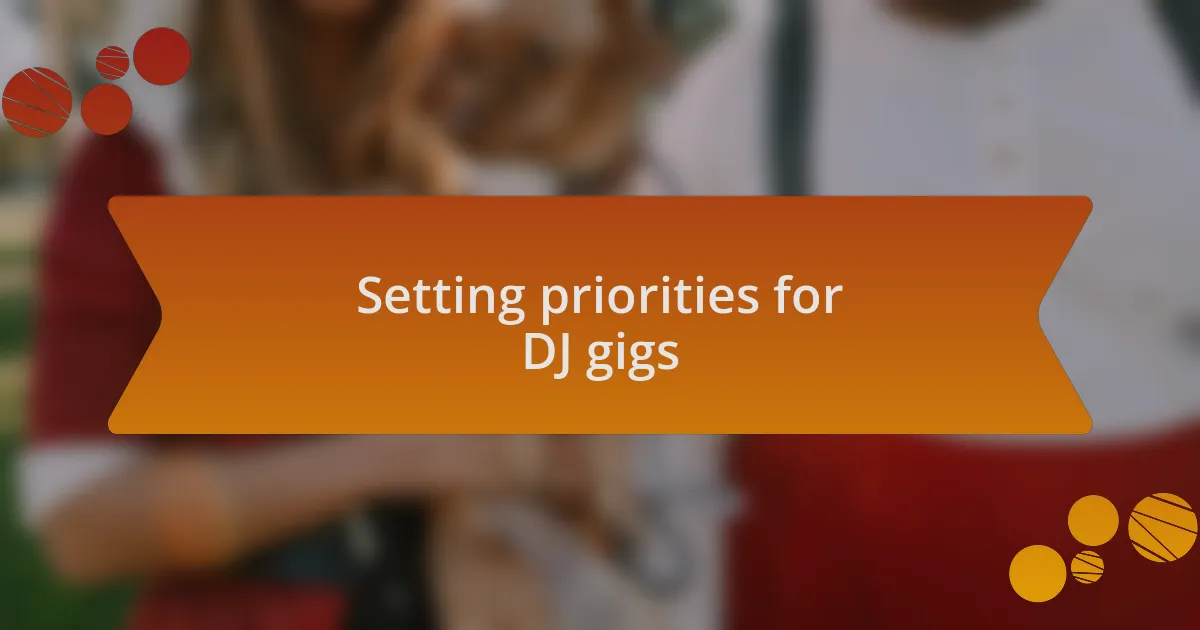
Setting priorities for DJ gigs
Setting priorities for DJ gigs often feels like a balancing act. I remember a time when I was juggling multiple bookings, each with its own vibe and audience. I learned that I must prioritize not just based on availability, but also on how well a gig aligns with my brand and artistic direction. Have you ever taken a gig only to realize it wasn’t the right fit for you?
When deciding which gigs to take, I always consider factors like location and the venue’s reputation. A memorable experience I had was spinning at a small local spot that unexpectedly drew a massive crowd. That opportunity, despite seeming less prestigious at first, became a pivotal moment in my career. How do you weigh the potential of smaller venues against larger events?
Ultimately, I find that engaging with my audience is key in deciding my priorities. I’ve noticed that gigs where I can connect with the crowd tend to be the most fulfilling. It’s about more than just turning tables; it’s about creating experiences that resonate. What inspires you to choose where to perform next?

Communicating with venue managers
Building a strong line of communication with venue managers is essential for a successful DJ career. I recall reaching out to a venue manager after a disappointing experience at a gig. I was surprised by how receptive they were to feedback, and it led to a lasting relationship that opened doors for future opportunities. How often do we underestimate the power of a simple conversation?
Establishing clear expectations from the beginning is crucial. I remember discussing technical requirements before a show, which ensured everything went smoothly on the night. When both parties are on the same page, it not only minimizes potential issues but also fosters a sense of collaboration. Isn’t it refreshing to have that kind of partnership?
Furthermore, regular check-ins with venue managers help reinforce that connection. I sometimes drop a quick message after a gig to thank them for the opportunity or share how much I enjoyed the crowd. This small gesture keeps the lines of communication open and positions you positively for future events. Have you found ways to maintain those relationships?
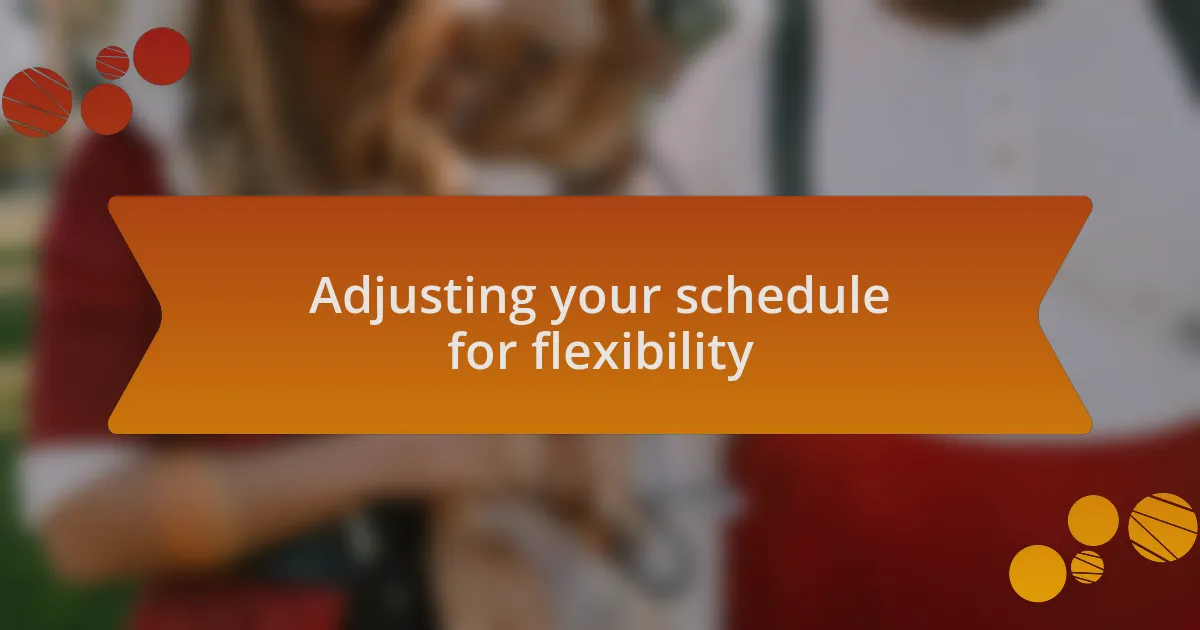
Adjusting your schedule for flexibility
Adjusting my DJ schedule for flexibility has been a game changer in my career. There have been times when I’ve juggled last-minute gig requests while still honoring previous commitments. I remember one night clear as day; I had a wedding booked but a major club gig opened up. I spoke to the couple, and we negotiated an earlier start time – allowing me to keep both gigs. How many opportunities have I almost missed because I wasn’t willing to adjust?
Flexibility isn’t just about shifting dates; it’s about being available for unexpected opportunities. One time, I got a call just hours before a local festival needed a last-minute DJ. With some smart adjustments to my planned evening, I was able to step in and deliver an unforgettable set. Have you ever found that your best moments come when you’re willing to adapt?
I’ve learned to always have a backup plan. Keeping my weekends open as much as possible allows me to leap at last-minute bookings without too much stress. Planning for the unexpected has saved me countless times; I trust my instincts and adapt quickly when the situation calls for it. In the end, isn’t the thrill of spontaneity what makes this journey as a DJ so exciting?